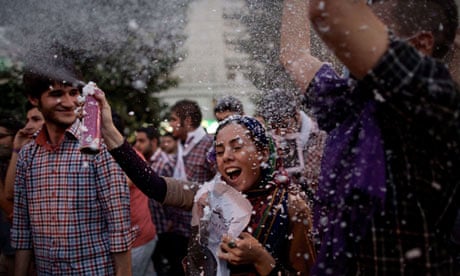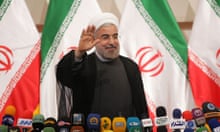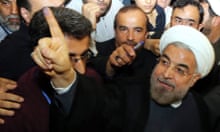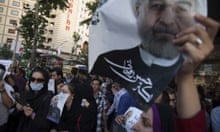The evening the results of the presidential election were announced, I locked myself in – a voluntary house arrest. Moments after Hassan Rouhani's victory was officially endorsed, Tehran had burst into celebration. Hearing the happy clamor of crowds cheering the victory of their presidential candidate placed me, unexpectedly, within a minority.
This was the minority who had not voted because they do not believe in gradual reform within a militaristic theocracy, and because they are unwilling to trade the long-term interests of the Iranian people for skin-deep change.
It was a drunken sort of celebration (sans alcohol, of course). Those who voted must have needed to get drunk. With a deft sleight of hand, the regime had not only led the populace to vote, with no little hope and hoopla, for a conservative cleric from the military/security apparatus, but it also had them feeling that this time around their vote was not stolen, even that they had made history.
What the celebrations clarified was that we had, indeed, been played.
The middle class, scared out of its wits by the prospect of another Mahmoud Ahmadinejad, had demonstrated that it would accept whatever alternative the regime would allow. The burgeoning radicalism that, had there been a refusal to participate in the masquerade, could have dug in its roots and grown into a formidable challenge to the regime was forsworn. Ideals of freedom and civic participation gave way to a naïvely optimistic reliance on the right to vote.
Even a large number of experienced political activists, brandishing sentimental slogans about democracy, put their weight behind the election. The list of demands the crowd turned into impromptu slogans was so long and thorough that you would think Rouhani held the "key" (the symbol of his campaign) to a storehouse of panacea. One can only pray that it will not turn out to be hemlock instead.
The reality is that Rouhani is an excellent choice – for the ruling elite. The current condition of out-and-out economic and political bankruptcy demands a figure like him: someone with no real clout (has anyone paid him a thought in the past 30 years?) but clean enough hands to try and wipe away the memory of Ahmadinejad's corrupt, destructive presidency. Someone to blow hot air into the deflated balloon that carries the regime's banner of "democracy."
In the aftermath of Rouhani's election, the people's list of demands only grows: he is to release political prisoners, rein in the brutal Revolutionary Guards, end the atomic danse macabre with the west, convince the US to find another bad guy for its foreign policy, and so on. What is interesting is that the Iranian public could not possibly have forgotten the failure of reformist president Mohammad Khatami – with his much stronger mandate – to achieve very similar goals. The Khatami experiment now seems not so much like a bright spot in the past, but rather a short-lived flare in the dark.
Four years ago, the street clashes that followed the presidential election began with a stately gesture: a silent protest, composed of millions, who posed a simple, rhetorical question, "Where is my vote?"
As the silence broke and the protests faced mounting violence, the question was turned into a promise to the lost: "Neda [Agha Soltan], Sohrab [Arabi], we will take back your vote!"
Now, in the jubilation that followed the announcement of Rouhani's victory, crowds declared the fulfillment of that promise: "Neda, Sohrab, we took back your vote!" Did no one stop to consider the absurdity of mirroring these two events: one in which Supreme Leader Ali Khamenei brazenly disregarded democratic procedure, and another in which he played the magnanimous father, generously allowing the vote to be counted?
Does not this second election, with its halo of legitimacy, make a mockery of the green movement? And do we not, as we dance before the cool stares of the same security forces that four years ago would have torn into our crowd, condone that mockery? The celebration was a willful attempt at disregarding such questions. That is inaction.
What is the relationship between those who voted for Rouhani and those who did not vote at all? It seems to me that the conversation has degenerated into mutual interrogations. The abstainers want to know why the other side consented to a compromise. The voters demand to know what the other side would have happen: Civil war? Foreign intervention? Total stasis?
The questions are pointless. The radical type of resistance in which abstainers such as I believe cannot be demanded. At the same time, people have a right to make compromises. They are not insensate. They know what sacrifices they can and cannot make.
Four years ago, Iran's green movement offered some lessons to the world about street politics. Today the lessons come from the streets of Egypt. Blind street politics, the type of politics that is concerned only with immediate personal or group interest, turns the populace into puppets of power.
What a statement it would have been if the same crowds who came out to protest against Mohammad Morsi in Egypt came out as well to protest the massacre of his supporters. As for the night the election results were announced in Iran, we should have come out, but not for a jig and a dance, rather for a stone-faced, defiant vigil.
For now, the only long-term benefit we Iranians can draw from the new, forthcoming presidency is to take advantage of the relative opening it offers and get down to the work of social organising, of training another generation to do political work. In this way, and today maybe only in this way, we can do honour to what and who has been lost in the fight for freedom.





Comments (…)
Sign in or create your Guardian account to join the discussion